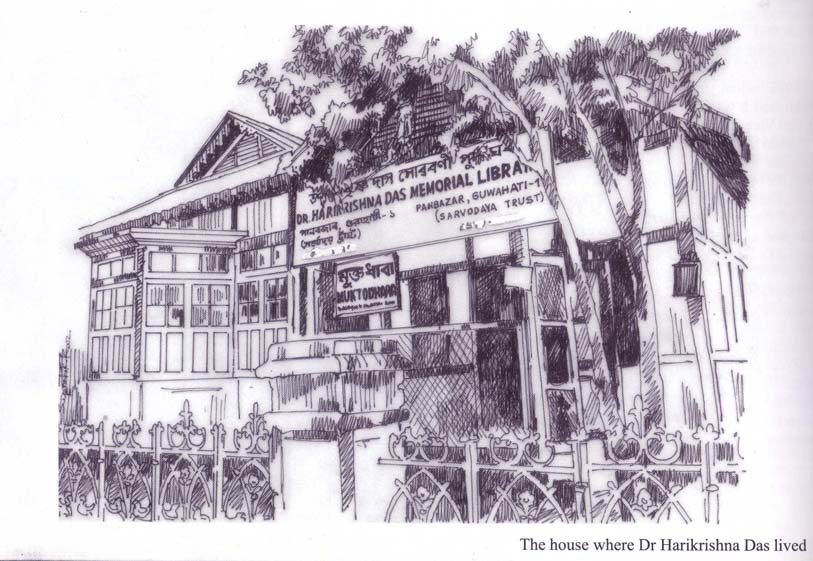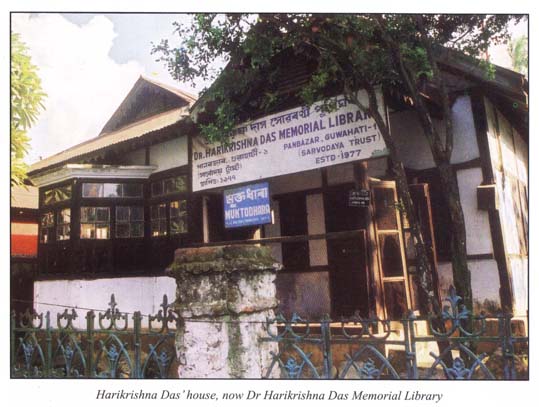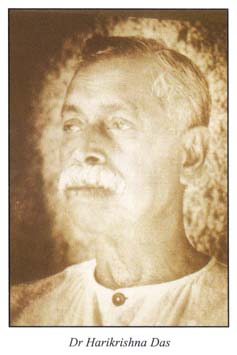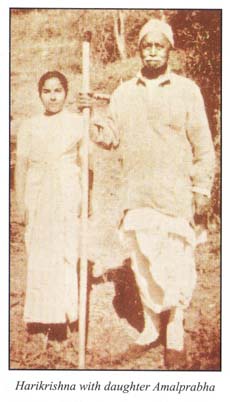HOUSE OF HOSPITALITY
 |
In the pre-Independence days, Dr Harikrishna Das’ house, located on erstwhile Nathan Road in Panbazar between Harisabha and Kamarpatty Church, was a big draw. The house had two wings, well-laid gardens, fruit trees, a huge lawn and a bowling green. In other words, it was picture-perfect. Other than its façade however, its generous-hearted residents. The house provided medicine and care to sick and shelter to nationalists. It was also a place of gathering for political activities.
|
Harikrishna Das, popularly known as Harikrishna dactor, was born in remote Kanora village of Barpeta district. He obtained his MBBS degree from Calcutta in 1900 and became a teacher of surgery at the Berry White Medical School in Dibrugarh. In 1925 he was also elevated to post of civil surgeon of Nagaon, the first Assamese doctor to get honour. But since 1921 he had become influenced by Mohandas Karamchand Gandhi’s non-violent non-cooperation and in 1927, he resigned from the prestigious post and decided to dedicate his life to the cause of the motherland. He came down to Guwahati, built the house in Panbazar and also opened a clinic in its premises. The house was soon to become the center of Congress activities. The doctor was a nationalist par excellence who besides arranging for Congress meetings even offered the use of his home for making nationalist posters in the 1930s. He bought slides and magic lanterns from Calcutta that he displayed on the lawns of his house, and later in the villages. No doubt many of the slides concerned health, but some were also of Congress slogans. |
|
In 1931, the British government stopped Harikrishhna’s pension because of his pro-nationalist activities. The doctor however continued working for the Congress with renewed vigor. He became president of the district Congress committee for two terms - in 1936 and 1937. After the release of the notorious Cunningham Circular, plans for protest meetings were chalked out in Das’ house. Many a time, particularly in 1942-43, the house was also raided for anti-national activities.
|
|
A singular distinction of the house is that it is the only one in the entire visits to the region. Mahatma Gandhi stayed at the house during his third visit to Assam in April 1934. Three years later, in 1937, when Nehru came to Guwahati on Congress organizational work, he stayed with the Das family. Among other luminaries who were guest here were Acharaya Dharmadhikari Baba Raghab Das, Kakasaheb Karlekar and Arun Asaf Ali. Harikrishna Das, his gracious wife Hemaprabha and daughters Tillottama and Amalprabha were perfect hosts. The family’s Ford car used to invariably be put at the disposal of all of their guests. During Gandhi’s visit, Harikrishna Das even constructed a new room to secure the Mahatma’s comfort. Freedom fighter Lakhidar Bora, who along with Radhika Ram Das, was assigned the task of looking after Gandhi, was later to write in his memoirs Muktijujar Sonwaran that though Gandhi did use the room as his study he preferred to sleep in the courtyard under a shamiana.Octogenarian Umesh Sengupta also served as a volunteer during Gandhi’s visit and remembers: “The entire Nathan road wore a festive look during those few days as hundreds of people assembled at Das’ house to catch a glimpse of the great leader”. He recalls the day Gandhi decided to shave his beard to catch a glimpse of the great leader.” He recalls the day Gandhi decided to shave his beard and Kamala napit (barbar) who stayed nearby was called in to perform he task. Several people had meanwhile gathered I the lawns and were shouting slogans like Gandhi zindabad and Bharat Mata Ki Jai. Kamala napit was gradually losing his concentration and growing irritable. Realizing this, Gandhi smiled and told him to calm down since Monu baideo (Amalprabha) was quite adept at controlling the crowd. |
|
During Nehru’s visit in 1937, a loudspeaker was put to use for the first time in the town. As district Congress president Harikrishna Das arranged with Delhi’s Chicago Radio Company for Nehru’s lecture, delivered at Judges Field, to be broadcast over loudspeakers, which according to a British Intelligence report was a “great crowd-pullar”. Before his death Harikrishna Das donated his entire property in Sarania Hills to the Sarbodaya Trust. The Congress office at Happy Villa in Chenikuthi was also built on land donated by him. Later, in the year 1977, his daughters donated the family home in Panbazar to the Sarbodaya Trust. |
 |

